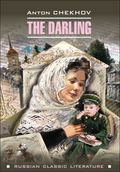
Антон Чехов
The House with the Mezzanine and Other Stories
IV
And Anna Sergueyevna began to come to him in Moscow. Once every two or three months she would leave S., telling her husband that she was going to consult a specialist in women's diseases. Her husband half believed and half disbelieved her. At Moscow she would stay at the "Slaviansky Bazaar" and send a message at once to Gomov. He would come to her, and nobody in Moscow knew.
Once as he was going to her as usual one winter morning – he had not received her message the night before – he had his daughter with him, for he was taking her to school which was on the way. Great wet flakes of snow were falling.
"Three degrees above freezing," he said, "and still the snow is falling. But the warmth is only on the surface of the earth. In the upper strata of the atmosphere there is quite a different temperature."
"Yes, papa. Why is there no thunder in winter?"
He explained this too, and as he spoke he thought of his assignation, and that not a living soul knew of it, or ever would know. He had two lives; one obvious, which every one could see and know, if they were sufficiently interested, a life full of conventional truth and conventional fraud, exactly like the lives of his friends and acquaintances; and another, which moved underground. And by a strange conspiracy of circumstances, everything that was to him important, interesting, vital, everything that enabled him to be sincere and denied self-deception and was the very core of his being, must dwell hidden away from others, and everything that made him false, a mere shape in which he hid himself in order to conceal the truth, as for instance his work in the bank, arguments at the club, his favourite gibe about women, going to parties with his wife – all this was open. And, judging others by himself, he did not believe the things he saw, and assumed that everybody else also had his real vital life passing under a veil of mystery as under the cover of the night. Every man's intimate existence is kept mysterious, and perhaps, in part, because of that civilised people are so nervously anxious that a personal secret should be respected.
When he had left his daughter at school, Gomov went to the "Slaviansky Bazaar." He took off his fur coat down-stairs, went up and knocked quietly at the door. Anna Sergueyevna, wearing his favourite grey dress, tired by the journey, had been expecting him to come all night. She was pale, and looked at him without a smile, and flung herself on his breast as soon as he entered. Their kiss was long and lingering as though they had not seen each other for a couple of years.
"Well, how are you getting on down there?" he asked. "What is your news?"
"Wait. I'll tell you presently… I cannot."
She could not speak, for she was weeping. She turned her face from him and dried her eyes.
"Well, let her cry a bit… I'll wait," he thought, and sat down.
Then he rang and ordered tea, and then, as he drank it, she stood and gazed out of the window… She was weeping in distress, in the bitter knowledge that their life had fallen out so sadly; only seeing each other in secret, hiding themselves away like thieves! Was not their life crushed?
"Don't cry… Don't cry," he said.
It was clear to him that their love was yet far from its end, which there was no seeing. Anna Sergueyevna was more and more passionately attached to him; she adored him and it was inconceivable that he should tell her that their love must some day end; she would not believe it.
He came up to her and patted her shoulder fondly and at that moment he saw himself in the mirror.
His hair was already going grey. And it seemed strange to him that in the last few years he should have got so old and ugly. Her shoulders were warm and trembled to his touch. He was suddenly filled with pity for her life, still so warm and beautiful, but probably beginning to fade and wither, like his own. Why should she love him so much? He always seemed to women not what he really was, and they loved in him, not himself, but the creature of their imagination, the thing they hankered for in life, and when they had discovered their mistake, still they loved him. And not one of them was happy with him. Time passed; he met women and was friends with them, went further and parted, but never once did he love; there was everything but love.
And now at last when his hair was grey he had fallen in love, real love – for the first time in his life.
Anna Sergueyevna and he loved one another, like dear kindred, like husband and wife, like devoted friends; it seemed to them that Fate had destined them for one another, and it was inconceivable that he should have a wife, she a husband; they were like two birds of passage, a male and a female, which had been caught and forced to live in separate cages. They had forgiven each other all the past of which they were ashamed; they forgave everything in the present, and they felt that their love had changed both of them.
Formerly, when he felt a melancholy compunction, he used to comfort himself with all kinds of arguments, just as they happened to cross his mind, but now he was far removed from any such ideas; he was filled with a profound pity, and he desired to be tender and sincere…
"Don't cry, my darling," he said. "You have cried enough… Now let us talk and see if we can't find some way out."
Then they talked it all over, and tried to discover some means of avoiding the necessity for concealment and deception, and the torment of living in different towns, and of not seeing each other for a long time. How could they shake off these intolerable fetters?
"How? How?" he asked, holding his head in his hands. "How?"
And it seemed that but a little while and the solution would be found and there would begin a lovely new life; and to both of them it was clear that the end was still very far off, and that their hardest and most difficult period was only just beginning.
GOUSSIEV
IT was already dark and would soon be night.
Goussiev, a private on long leave, raised himself a little in his hammock and said in a whisper:
"Can you hear me, Pavel Ivanich? A soldier at Souchan told me that their boat ran into an enormous fish and knocked a hole in her bottom."
The man of condition unknown whom he addressed, and whom everybody in the hospital-ship called Pavel Ivanich, was silent, as if he had not heard.
And once more there was silence… The wind whistled through the rigging, the screw buzzed, the waves came washing, the hammocks squeaked, but to all these sounds their ears were long since accustomed and it seemed as though everything were wrapped in sleep and silence. It was very oppressive. The three patients – two soldiers and a sailor – who had played cards all day were now asleep and tossing to and fro.
The vessel began to shake. The hammock under Goussiev slowly heaved up and down, as though it were breathing – one, two, three… Something crashed on the floor and began to tinkle: the jug must have fallen down.
"The wind has broken loose…" said Goussiev, listening attentively.
This time Pavel Ivanich coughed and answered irritably:
"You spoke just now of a ship colliding with a large fish, and now you talk of the wind breaking loose… Is the wind a dog to break loose?"
"That's what people say."
"Then people are as ignorant as you… But what do they not say? You should keep a head on your shoulders and think. Silly idiot!"
Pavel Ivanich was subject to seasickness. When the ship rolled he would get very cross, and the least trifle would upset him, though Goussiev could never see anything to be cross about. What was there unusual in his story about the fish or in his saying that the wind had broken loose? Suppose the fish were as big as a mountain and its back were as hard as a sturgeon's, and suppose that at the end of the wood there were huge stone walls with the snarling winds chained up to them… If they do not break loose, why then do they rage over the sea as though they were possessed, and rush about like dogs? If they are not chained, what happens to them when it is calm?
Goussiev thought for a long time of a fish as big as a mountain, and of thick rusty chains; then he got tired of that and began to think of his native place whither he was returning after five years' service in the Far East. He saw with his mind's eye the great pond covered with snow… On one side of the pond was a brick-built pottery, with a tall chimney belching clouds of black smoke, and on the other side was the village… From the yard of the fifth house from the corner came his brother Alency in a sledge; behind him sat his little son Vanka in large felt boots, and his daughter Akulka, also in felt boots. Alency is tipsy, Vanka laughs, and Akulka's face is hidden – she is well wrapped up.
"The children will catch cold …" thought Goussiev. "God grant them," he whispered, "a pure right mind that they may honour their parents and be better than their father and mother…"
"The boots want soling," cried the sick sailor in a deep voice. "Aye, aye."
The thread of Goussiev's thoughts was broken, and instead of the pond, suddenly – without rhyme or reason – he saw a large bull's head without eyes, and the horse and sledge did not move on, but went round and round in a black mist. But still he was glad he had seen his dear ones. He gasped for joy, and his limbs tingled and his fingers throbbed.
"God suffered me to see them!" he muttered, and opened his eyes and looked round in the darkness for water.
He drank, then lay down again, and once more the sledge skimmed along, and he saw the bull's head without eyes, black smoke, clouds of it. And so on till dawn.
II
At first through the darkness there appeared only a blue circle, the port-hole, then Goussiev began slowly to distinguish the man in the next hammock, Pavel Ivanich. He was sleeping in a sitting position, for if he lay down he could not breathe. His face was grey; his nose long and sharp, and his eyes were huge, because he was so thin; his temples were sunk, his beard scanty, the hair on his head long… By his face it was impossible to tell his class: gentleman, merchant, or peasant; judging by his appearance and long hair he looked almost like a recluse, a lay-brother, but when he spoke – he was not at all like a monk. He was losing strength through his cough and his illness and the suffocating heat, and he breathed heavily and was always moving his dry lips. Noticing that Goussiev was looking at him, he turned toward him and said:
"I'm beginning to understand… Yes… Now I understand."
"What do you understand, Pavel Ivanich?"
"Yes… It was strange to me at first, why you sick men, instead of being kept quiet, should be on this steamer, where the heat is stifling, and stinking, and pitching and tossing, and must be fatal to you; but now it is all clear to me… Yes. The doctors sent you to the steamer to get rid of you. They got tired of all the trouble you gave them, brutes like you.
…You don't pay them; you only give a lot of trouble, and if you die you spoil their reports. Therefore you are just cattle, and there is no difficulty in getting rid of you… They only need to lack conscience and humanity, and to deceive the owners of the steamer. We needn't worry about the first, they are experts by nature; but the second needs a certain amount of practice. In a crowd of four hundred healthy soldiers and sailors – five sick men are never noticed; so you were carried up to the steamer, mixed with a healthy lot who were counted in such a hurry that nothing wrong was noticed, and when the steamer got away they saw fever-stricken and consumptive men lying helpless on the deck…"
Goussiev could not make out what Pavel Ivanich was talking about; thinking he was being taken to task, he said by way of excusing himself:
"I lay on the deck because when we were taken off the barge I caught a chill."
"Shocking!" said Pavel Ivanich. "They know quite well that you can't last out the voyage, and yet they send you here! You may get as far as the Indian Ocean, but what then? It is awful to think of… And that's all the return you get for faithful unblemished service!"
Pavel Ivanich looked very angry, and smote his forehead and gasped:
"They ought to be shown up in the papers. There would be an awful row."
The two sick soldiers and the sailor were already up and had begun to play cards, the sailor propped up in his hammock, and the soldiers squatting uncomfortably on the floor. One soldier had his right arm in a sling and his wrist was tightly bandaged so that he had to hold the cards in his left hand or in the crook of his elbow. The boat was rolling violently so that it was impossible to get up or to drink tea or to take medicine.
"You were an orderly?" Pavel Ivanich asked Goussiev.
"That's it. An orderly."
"My God, my God!" said Pavel Ivanich sorrowfully. "To take a man from his native place, drag him fifteen thousand miles, drive him into consumption … and what for? I ask you. To make him an orderly to some Captain Farthing or Midshipman Hole! Where's the sense of it?"
"It's not a bad job, Pavel Ivanich. You get up in the morning, clean the boots, boil the samovar, tidy up the room, and then there is nothing to do. The lieutenant draws plans all day long, and you can pray to God if you like – or read books – or go out into the streets. It's a good enough life."
"Yes. Very good! The lieutenant draws plans, and you stay in the kitchen all day long and suffer from homesickness… Plans… Plans don't matter. It's human life that matters! Life doesn't come again. One should be sparing of it."
"Certainly Pavel Ivanich. A bad man meets no quarter, either at home, or in the army, but if you live straight, and do as you are told, then no one will harm you. They are educated and they understand… For five years now I've never been in the cells and I've only been thrashed once – touch wood!"
"What was that for?"
"Fighting. I have a heavy fist, Pavel Ivanich. Four Chinamen came into our yard: they were carrying wood, I think, but I don't remember. Well, I was bored. I went for them and one of them got a bloody nose. The lieutenant saw it through the window and gave me a thick ear."
"You poor fool," muttered Pavel Ivanich. "You don't understand anything."
He was completely exhausted with the tossing of the boat and shut his eyes; his head fell back and then flopped forward onto his chest. He tried several times to lie down, but in vain, for he could not breathe.
"And why did you go for the four Chinamen?" he asked after a while.
"For no reason. They came into the yard and I went for them."
Silence fell… The gamblers played for a couple of hours, absorbed and cursing, but the tossing of the ship tired even them; they threw the cards away and laid down. Once more Goussiev thought of the big pond, the pottery, the village. Once more the sledges skimmed along, once more Vanka laughed, and that fool of an Akulka opened her fur coat, and stretched out her feet; look, she seemed to say, look, poor people, my felt boots are new and not like Vanka's.
"She's getting on for six and still she has no sense!" said Goussiev. "Instead of showing your boots off, why don't you bring some water to your soldier-uncle? I'll give you a present."
Then came Andrea, with his firelock on his shoulder, carrying a hare he had shot, and he was followed by Tsaichik the cripple, who offered him a piece of soap for the hare; and there was the black heifer in the yard, and Domna sewing a shirt and crying over something, and there was the eyeless bull's head and the black smoke…
Overhead there was shouting, sailors running; the sound of something heavy being dragged along the deck, or something had broken… More running. Something wrong? Goussiev raised his head, listened and saw the two soldiers and the sailor playing cards again; Pavel Ivanich sitting up and moving his lips. It was very close, he could hardly breathe, he wanted a drink, but the water was warm and disgusting… The pitching of the boat was now better.
Suddenly something queer happened to one of the soldiers… He called ace of diamonds, lost his reckoning and dropped his cards. He started and laughed stupidly and looked round.
"In a moment, you fellows," he said and lay down on the floor.
All were at a loss. They shouted at him but he made no reply.
"Stiepan, are you ill?" asked the other soldier with the bandaged hand. "Perhaps we'd better call the priest, eh?"
"Stiepan, drink some water," said the sailor. "Here, mate, have a drink."
"What's the good of breaking his teeth with the jug," shouted Goussiev angrily. "Don't you see, you fatheads?"
"What."
"What!" cried Goussiev. "He's snuffed it, dead. That's what! Good God, what fools!.."
III
The rolling stopped and Pavel Ivanich cheered up. He was no longer peevish. His face had an arrogant, impetuous, and mocking expression. He looked as if he were on the point of saying: "I'll tell you a story that will make you die of laughter." Their port-hole was open and a soft wind blew in on Pavel Ivanich. Voices could be heard and the splash of oars in the water… Beneath the window some one was howling in a thin, horrible voice; probably a Chinaman singing.
"Yes. We are in harbour," said Pavel Ivanich, smiling mockingly. "Another month and we shall be in Russia. It's true; my gallant warriors, I shall get to Odessa and thence I shall go straight to Kharkhov. At Kharkhov I have a friend, a literary man. I shall go to him and I shall say, 'now, my friend, give up your rotten little love-stories and descriptions of nature, and expose the vileness of the human biped… There's a subject for you.'"
He thought for a moment and then he said:
"Goussiev, do you know how I swindled them?"
"Who, Pavel Ivanich?"
"The lot out there… You see there's only first and third class on the steamer, and only peasants are allowed to go third. If you have a decent suit, and look like a nobleman or a bourgeois, at a distance, then you must go first. It may break you, but you have to lay down your five hundred roubles. 'What's the point of such an arrangement?' I asked. 'Is it meant to raise the prestige of Russian intellectuals?' 'Not a bit,' said they. 'We don't let you go, simply because it is impossible for a decent man to go third. It is so vile and disgusting.' 'Yes,' said I. 'Thanks for taking so much trouble about decent people. Anyhow, bad or no, I haven't got five hundred roubles as I have neither robbed the treasury nor exploited foreigners, nor dealt in contraband, nor flogged any one to death, and, therefore, I think I have a right to go first-class and to take rank with the intelligentsia of Russia.' But there's no convincing them by logic… I had to try fraud. I put on a peasant's coat and long boots, and a drunken, stupid expression and went to the agent and said: 'Give me a ticket, your Honour.'
"'What's your position?' says the agent.
"'Clerical,' said I. 'My father was an honest priest. He always told the truth to the great ones of the earth, and so he suffered much.'"
Pavel Ivanich got tired with talking, and his breath failed him, but he went on:
"Yes. I always tell the truth straight out… I am afraid of nobody and nothing. There's a great difference between myself and you in that respect. You are dull, blind, stupid, you see nothing, and you don't understand what you do see. You are told that the wind breaks its chain, that you are brutes and worse, and you believe; you are thrashed and you kiss the hand that thrashes you; a swine in a raccoon pelisse robs you, and throws you sixpence for tea, and you say: 'Please, your Honour, let me kiss your hand.' You are pariahs, skunks… I am different. I live consciously. I see everything, as an eagle or a hawk sees when it hovers over the earth, and I understand everything. I am a living protest. I see injustice – I protest; I see bigotry and hypocrisy – I protest; I see swine triumphant – I protest, and I am unconquerable. No Spanish inquisition can make me hold my tongue. Aye… Cut my tongue out. I'll protest by gesture… Shut me up in a dungeon – I'll shout so loud that I shall be heard for a mile round, or I'll starve myself, so that there shall be a still heavier weight on their black consciences. Kill me – and my ghost will return. All my acquaintances tell me: 'You are a most insufferable man, Pavel Ivanich!' I am proud of such a reputation. I served three years in the Far East, and have got bitter memories enough for a hundred years. I inveighed against it all. My friends write from Russia: 'Do not come.' But I'm going, to spite them… Yes… That is life. I understand. You can call that life."
Goussiev was not listening, but lay looking out of the port-hole; on the transparent lovely turquoise water swung a boat all shining in the shimmering light; a fat Chinaman was sitting in it eating rice with chop-sticks. The water murmured softly, and over it lazily soared white sea-gulls.
"It would be fun to give that fat fellow one on the back of his neck…" thought Goussiev, watching the fat Chinaman and yawning.
He dozed, and it seemed to him that all the world was slumbering. Time slipped swiftly away. The day passed imperceptibly; imperceptibly the twilight fell… The steamer was still no longer but was moving on.






